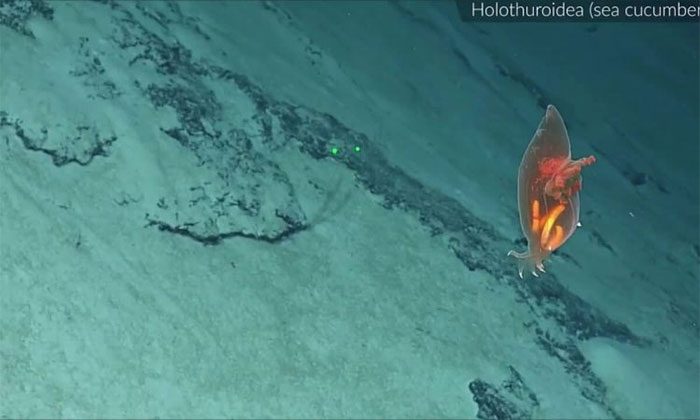Remote-operated vehicles help scientists discover a new species of sea cucumber with a transparent body and uniquely bright orange intestines.
A team of experts aboard the research vessel Nautilus from the Ocean Exploration Trust used a remote-operated vehicle (ROV) to capture footage of a strange organism with an orange and transparent body in March. At that time, it was wandering at a depth of about 2,201 meters beneath the waters southeast of Honolulu, Hawaii. This is actually a previously undiscovered species of sea cucumber, reported Live Science on May 21.
Sea cucumbers are a diverse group of organisms with many species distributed throughout the Central Pacific region, according to Megan Cook, an expert at the Ocean Exploration Trust. She noted that the newly discovered sea cucumber belongs to the family Elpidiidae. They are scavengers living in deep-sea environments, typically feeding on marine snow—a “rain” composed of skin cells, feces, and bits of animal remains that fall to the ocean floor.
Many species in the family Elpidiidae have appendages resembling fins that help them swim short distances. This adaptation allows sea cucumbers to move over larger areas and seek out new foraging locations, Cook explained.

The newly discovered sea cucumber belongs to the family Elpidiidae.
Sea cucumbers scour the ocean floor using sticky tentacles—red, leaf- or star-shaped structures around their mouths—to collect a mix of sand and organic matter, which they then bring to their mouths. The bright orange intestines inside their transparent bodies help digest organic matter and excrete inedible sand. This process creates an important carbon storage system.
The ocean floor is the largest carbon-absorbing system on Earth. Carbon-rich organic matter is absorbed by deep-sea organisms like sea cucumbers and remains trapped in the deep sea for extended periods. “They are excellent recyclers/scavengers on the ocean floor,” Cook remarked about deep-sea sea cucumbers.
When frightened, some species of sea cucumbers can expel their digestive tracts through their anuses, allowing them to escape from hungry predators. These organs will quickly regenerate. However, scientists are unsure if the newly discovered species has this capability.
The Nautilus vessel live-streams the ROV’s dives, and the current research mission is expected to continue until the end of October. The research team will continue exploring the Central Pacific region. “The next ROV dives will head towards Johnston, one of the most remote coral islands in the world,” Cook stated.


















































